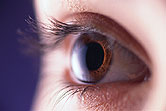
FRIDAY, Dec. 13, 2013 (HealthDay News) — Simply imagining scenes such as a sunny day or a night sky can cause your pupils to change size, a new study finds.
Pupils automatically dilate (get bigger) or contract (get smaller) in response to the amount of light entering the eye. This study shows that visualizing dark or bright scenes affects people’s pupils as if they were actually seeing the images.
In one experiment, participants looked at a screen with triangles of different levels of brightness. When later asked to imagine those triangles, the participants’ pupils varied in size according to each triangle’s brightness. When they imagined brighter triangles, their pupils were smaller, and when they imagined darker triangles, their pupils were larger.
Pupils also changed diameter when study participants imagined a sunny sky, a dark room, or a face in the sun versus a face in the shade, according to the study published online Nov. 27 in the journal Psychological Science.
The results of the experiments aren’t due to voluntary changes in pupil size or variations in the mental effort required to imagine scenes, the researchers pointed out in a news release from the Association for Psychological Science.
“Because humans cannot voluntarily constrict the eyes’ pupils, the presence of pupillary adjustments to imaginary light presents a strong case for mental imagery as a process based on brain states similar to those which arise during actual perception,” study leader Bruno Laeng, of the University of Oslo in Norway, said in the news release.
This research may potentially enable scientists to probe the mental experiences of animals, babies, and even patients with severe neurological disorders, the study authors suggested.
More information
The U.S. National Eye Institute explains how you see.
Copyright © 2026 HealthDay. All rights reserved.

